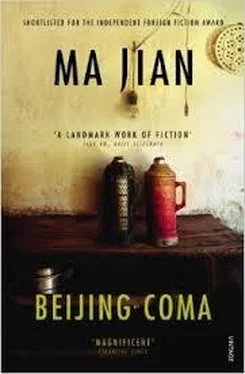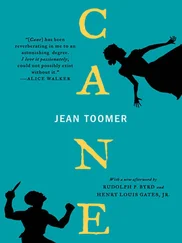There’s a horrible grating sound as my mother closes the window. The magazine she tossed onto my bed is slowly splaying its pages. Once the window is closed, the whiff of urine rising from the sheets grows stronger.
My mother walks to the door, bolts it shut, then returns to the chair.
‘By the time I was your age, I’d toured the Soviet Union and sung the lead role in Carmen . If your father hadn’t been labelled a rightist, I would have become a famous soloist…’ My mother turns to another page of the magazine. ‘Look, there she is again. Singing to foreign dignitaries. I don’t know how she got to be such a big star. She never applied herself to her art when she was at the opera company. Too busy flirting with the baritones…’ She flicks to the next page and sighs, ‘Huh, if only I hadn’t married your father…’
Rubbing off scraps of dried food stuck to her trousers, she continues, ‘I was one of the prettiest girls in the opera company. When your father joined the orchestra, he used to knock on my door every day and give me an apple. They were very expensive back then. But I didn’t allow him into my room. Then, a few months later, our opera company travelled to the countryside. The village was very poor. We stayed in an army barracks and were only given half a bowl of rice for supper. When we returned to the barracks after the performance, everyone was starving. Your father sneaked off to the kitchen and stole a bread roll for me. The police arrested him and made him write a self-criticism. If he hadn’t stolen that roll, I might never have married him…’ When my mother rambles on like this, she can talk herself to sleep.
Unfamiliar towns often smell strange and disconcerting. But new environments can stimulate the brain. Fish that swim to new waters every day are more alert and agile than those that remain in the same pond all their lives. Since the director gave me the qigong treatment on my second day at this hospital, I have become aware of the many unusual smells of this town. When the evening wind blows into the room, I feel them stimulating my nerve cells.
‘Huh, I’m wasting my time talking to you. I might as well be playing the lute to a cow… If I don’t get these medical fees reimbursed, you really will have to die. I can’t afford to keep you alive any longer…’
My mother’s words enter the ampullae of my inner ear. The body is a room with a locked door and an open window. Although you can peep in through the window, you can never enter the room or control what’s going on inside. Your organs behave as they wish. They can knock you down at any moment and leave you paralysed for the rest of your life.
‘Look at the prices they’re charging! Ninety per cent glucose solution is nine yuan a bottle, and the atropine is double the usual price as well.’ My mother is skimming through the hospital’s cost sheet. ‘Nursing only costs eight yuan a day, though, which is less than Beijing hospitals charge. If I can find another patient to share with you tomorrow, at least the room rate will be halved…’
The smell of dank earth blowing down from the mountain sticks to the walls of my trachea. It reminds me of the smell of death I detect on my breath after I’ve spent a week or more in hospital. I know the smell is just bad breath and that death itself is odourless, but I also know that a healthy person who falls sick is already in death’s waiting room. After patients lie in hospital wards for more than a week they begin to reek of helplessness.
Sickness is worse than death, though. When the body begins to rot, you lose your dignity and self-respect. You have to lie down, exposing your weaknesses and failings to the world, and allow doctors to probe and inspect all your previously well-guarded orifices.
I was looking forward to the director’s thought-waves entering my head again tomorrow, but the nurse has just informed my mother that he’s fallen ill and has had to cancel the session.
I imagine the wind chasing after me. I am dry and hard. My shrivelled skin yearns to suck the moisture from my marrow, like deer in summer that yearn to drink from a lake… My cheeks must have caved in by now. I looked cadaverous even before my brother moved abroad. My mother took a photograph of him and me together, and gave him a copy to take to England. When he saw it, he said, ‘I can’t take this with me. It’s bad luck to be photographed next to a corpse.’
You enter the mind of the man pointing his gun at you, and yell as he pulls the trigger. Those damaged brain cells will never repair. After you fall to the ground, you place your hand over the charred bullet hole, trying in vain to maintain some dignity.
I ran over to the telephone and waited for my brother to call back. There was a lot of noise around me. A group of students nearby sat huddled around a cassette player, singing along to a tape: ‘ Walk on, little sister. Don’t look back… ’
As soon as the phone rang, I clamped the receiver to one ear and stuck my finger in the other.
‘I just wanted to let you know that we’ll be coming up to Beijing soon,’ my brother said in a voice that sounded as mature as mine.
‘I don’t think that’s a good idea,’ I answered in a quiet monotone, hoping to dampen his enthusiasm. ‘Everyone’s fed up with the provincial students. They beg for handouts, then blow the cash on presents and fripperies…’
‘We won’t need your money. We’ve collected 100,000 yuan in donations.’
‘Really? That’s impressive. Most of the provincial students arrive with nothing. It’s chaos here.’
‘I know! What the hell’s been going on? Three days ago, you lot told us the hunger strike had been called off and the students were going to leave the Square. So we ended our occupation of Chengdu’s public square and returned to our campuses. But as soon as we got back, you sent us a message telling us to continue the struggle. So we returned to the square the next day. Then yesterday we heard you were planning to withdraw again, and we went back to our campuses. And now today we’ve been told to mobilise the workers and organise a mass industrial strike. Why do you keep changing your minds? Whose orders are we supposed to be following?’
‘I’m not even sure myself. The Beijing Students’ Federation, I suppose. Anyway, just stay where you are for the time being. Don’t come to Beijing…’
After I’d hung up, I regretted dissuading him from coming. My mother had told me that my cousin Kenneth had recently got married and was planning to bring his wife to China for their honeymoon. He was hoping I could show them around Beijing. I realised that if my brother were in town, he could show them around instead, which would save me a lot of trouble. I decided that I’d leave the Square in the morning and go home to rest for a couple of days. I was so weak with exhaustion, I couldn’t think straight.
I returned to the Monument’s lower terrace and saw a banner that said RECONVENE THE NATIONAL PEOPLE’S CONGRESS, PROMOTE DEMOCRACY, SACK LI PENG, END MILITARY RULE hanging on the obelisk like a pair of old knickers. Four guys with long hair and steel-toed boots who’d formed a rock band called May Flower sat on the Monument’s northern steps and performed one of their songs. A crowd of thousands gathered round them, clapping and cheering. I suddenly remembered it was Tian Yi’s birthday on the 28th, and reminded myself to buy her a present.
On the lower terrace, students were lying asleep, or sitting up talking, flicking away the swarms of mosquitoes and moths flying through the air. Guys on the southern steps were having a smoke and trying to chat up girls. It was just like any other night in the Square.
When I walked inside the broadcast tent, a long-haired student from the Central Academy of Art was waving his hands animatedly. ‘… We’re going to build a huge statue called the Goddess of Democracy,’ he said. ‘It’ll be amazing.’
Читать дальше












